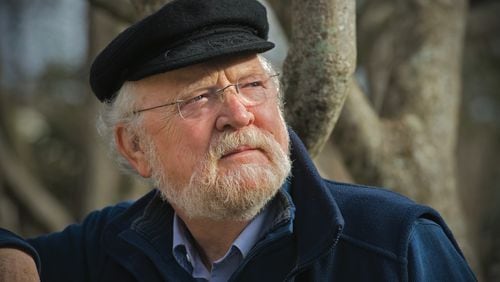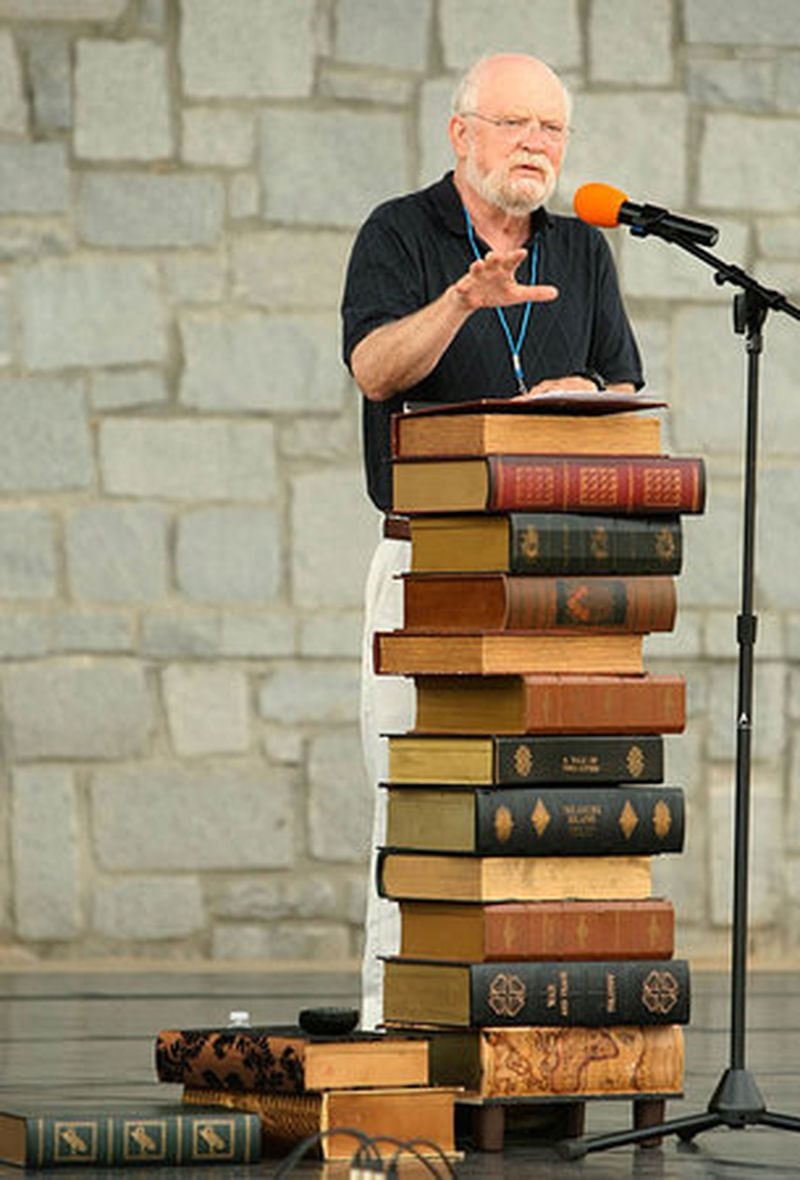Author Terry Kay often told the story of Pat Conroy coercing him into becoming a novelist. The yarn always ended with Kay saying, “For a boy who never wanted to write a book, it’s been a splendid adventure.”
The author’s many admirers could say the same after reading one of his beloved books.
Kay, 82, a masterful storyteller and author of the internationally acclaimed novel “To Dance with the White Dog,” died Saturday, Dec. 12, 2020.
He was diagnosed with stage 4 liver cancer in August. The family posted news of his passing on the author’s Facebook page, and his daughter Heather Kay Flury confirmed the news to The Atlanta Journal-Constitution.
Born the 11th child in a family of 12 children on Feb. 10, 1938, Kay grew up on a farm in northeast Georgia with no electricity, his only entertainment a battery-operated radio and books. He attended Royston High School, where he was quarterback of the football team and dated the head cheerleader, Tommie Duncan, whom he married in 1959.
Kay graduated from LaGrange College with a degree in social science and a passion for theater. He thought he might pursue a career as a teacher and planned to attend graduate school at Duke University. But first, he needed to earn some money.
Credit: Jason Getz jgetz@ajc.com
Credit: Jason Getz jgetz@ajc.com
How he became a writer is another well-burnished tale the gifted raconteur liked to tell in his sonorous voice. It started when “my wife got mad with me one day,” he told the AJC back in August.
It was 1959 and Kay was a 21-year-old newlywed. His wife worked during the day as an elementary school teacher, and Kay worked in the evenings making residential calls as an insurance salesman. Weary of their opposite sleep schedules, his wife shook him awake one morning and said, “When I come home today, you’ll have another job,” he recounted.
Later that day, perplexed over what to do next, “I heard a thump at the front door,” he said. “I went to the door and opened it, and at the bottom of the door was a little rolled up, ink-stained newspaper called the Decatur-DeKalb News. Inside was a classified ad that said, ‘Wanted: Young man to learn interesting profession.’”
The ad led to a job as a copy boy with the weekly newspaper, and thus began Kay’s journalism career.
“It’s almost embarrassing for me to admit this. I never took a journalism course,” he told the AJC. “I don’t remember a creative writing course.”
Kay went on to work at The Atlanta Journal, first as a sportswriter and then as a film and theater critic for eight years. He quit in 1973 to work in public relations and became senior vice president of corporate affairs for Oglethorpe Power Corp.
We are deeply saddened by the news of Terry Kay’s passing on December 12, 2020. Terry was truly the “godfather” of...
Posted by Georgia Center for the Book at DCPL on Sunday, December 13, 2020
Kay wrote his first book after Conroy — unbeknownst to Kay — convinced a high-powered literary agent in New York City that Kay had written a brilliant manuscript.
Conroy’s ruse came to light when Kay received a letter from the agent, requesting to see the manuscript.
“I had not written a word,” Kay said. “I yelled at (Conroy). I cursed him. I had no interest in writing a novel.”
Conroy suggested telling the agent either he had lied or Kay was still working on the manuscript. Kay chose the latter and spent two months writing 150 pages.
“To my shock and horror and great surprise, they offered me a small contract and a small advance to write a novel based on one vignette in that book,” Kay said. “And that’s how I came to be a writer.”
Published by Houghton Mifflin in 1976, “The Year the Lights Came On” is a semi-autobiographical coming-of-age story that takes places after World War II when electricity first came to rural Georgia. Kay would go on to publish 18 books, including a collection of essays and two children’s books. Limited to no one genre, his novels tend toward stories of love and loss set in the rural South told with compassion and a touch of nostalgia.
Kay is best known for his fourth novel, “To Dance with the White Dog,” published in 1990. Inspired by Kay’s father, the elegiac novel tells the story of a grieving man who believes the spirit of his dead wife visits him in the form of a white dog that no one else can see but him. The book was a huge hit that sold millions of copies and was made into a Hallmark Hall of Fame movie starring Hume Cronyn and Jessica Tandy in 1993. Japan was so taken with the book, more than 2 million copies sold there, a Japanese film version was made in 2002, and a theatrical adaptation received a staged reading in 2016.
Two more books were made into movies. His 2007 novel “The Valley of Light,” which won the Townsend Prize for Fiction, starred Chris Klein as an ace fisherman and Gretchen Mol as a grieving war widow who strike up a romance in the aftermath of World War II. “The Runaway,” a 1997 novel about an interracial friendship between two boys in the ’40s, was made into a movie in 2000 starring Dean Cain and Maya Angelou.
Kay received many accolades for his work. Inducted into the Georgia Writers Hall of Fame in 2006, he was the recipient of the Townsend Prize for Fiction, the Georgia Author of the Year Award, the Lifetime Achievement Award from the Georgia Writers Association and the Governor’s Award in the Humanities.
He continued to write throughout his life. His last book was “The Forever Wish of Middy Sweet,” published by Mercer University Press in August 2020.
In describing his creative process, Kay said his books typically began with an idea, but he was never sure where the writing would take him.
“I have never written to tell a story, I’ve only written to discover one,” he told the AJC. “I never wanted to be a writer to begin with, it simply happened.”
Kay, who lived in Athens, is survived by his wife, Tommie Duncan Kay, four children, 10 grandchildren and three great-grandchildren.








